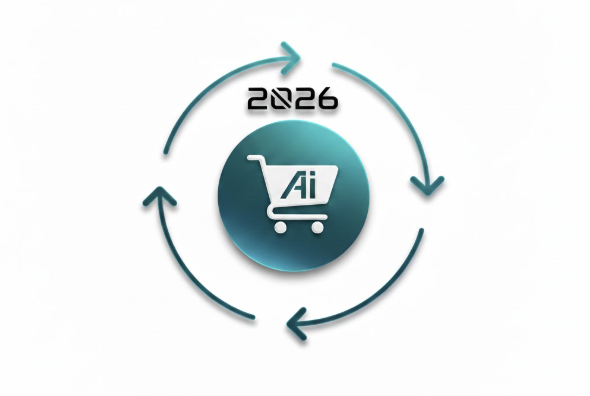How to Improve Product Discovery in Magento Open Source

Key Takeaways
- Magento Open Source faces critical product discovery limitations that can cause 30+ second page loads, 70% search abandonment rates, and significant revenue loss - requiring third-party solutions or custom development to achieve enterprise-level capabilities
- AI-powered search delivers measurable ROI with documented results showing 15-37% revenue increases, 2-3x higher conversion rates for search users, and up to 80% conversion rate improvements in real-world implementations
- The shift to intelligent product discovery is accelerating as 93% of retail organizations invest in AI, with modern solutions offering NLP, visual search, and real-time personalization that traditional keyword matching cannot match
- Implementation strategies vary by store size and complexity - from native ElasticSearch optimization for small catalogs to enterprise AI platforms handling millions of products with sub-100ms response times
- Envive's AI agents eliminate traditional implementation complexity by automatically understanding product catalogs, enriching data semantically, and delivering 3-4x conversion rate lifts without the technical burden of conventional solutions
Product discovery represents the critical junction between customer intent and purchase completion. For Magento Open Source merchants, the native search functionality creates a significant competitive disadvantage that compounds with catalog growth. Research from Baymard Institute reveals that 65% of users require multiple search attempts on e-commerce sites, while 60% of websites fail to support searches with common symbols and abbreviations.
The business impact is staggering. Poor product discovery contributes to $260 billion in recoverable lost orders annually across US and EU markets. For Magento Open Source specifically, merchants face database query performance issues that can result in 30+ second page loads when multiple filters are applied.
Understanding Magento Open Source Product Discovery Challenges
The Performance Crisis
Magento Open Source suffers from fundamental architectural limitations that become critical bottlenecks as catalogs grow. One documented case showed query performance degrading from under 1 second to over 30 seconds after a Magento update, with the database processing 47 million rows instead of 36,000 due to missing query optimizations.
Mobile users face even greater challenges. With 68% of e-commerce traffic coming from mobile devices, Magento's search interface issues become critical. GitHub issue tracking reveals persistent bugs including search bars that disappear immediately after opening, poor touch optimization, and non-responsive filter controls.
The Feature Gap
The performance gap between Magento Open Source and Adobe Commerce continues to widen. While Commerce edition includes AI-powered Adobe Live Search with intelligent faceting and visual search capabilities, Open Source merchants must rely on basic MySQL full-text search or implement ElasticSearch with minimal configuration options.
This creates a two-tier system where enterprise features essential for modern e-commerce remain out of reach for growing businesses. Advanced search functionality analysis shows that features like natural language processing, visual search, and AI-powered recommendations are exclusively available in paid tiers.
The Scale Problem
Traditional search approaches break down at scale. Real-world implementations with 3+ million products report indexing operations taking "several days to complete," with some processes requiring up to a week. This operational burden makes catalog updates nearly impossible for large merchants.
Why Traditional Search Falls Short in Modern E-commerce
The fundamental architecture of traditional keyword-based search cannot meet contemporary customer expectations. Modern shoppers engage with natural language queries, expect typo tolerance, and demand instant, relevant results. Yet 70% of e-commerce sites require users to search by exact website jargon, failing to return results for common synonyms or related terms.
Rigid Matching Systems
Magento's native search exemplifies these limitations. The platform's reliance on exact attribute matching means a search for "t-shirt" won't find products labeled as "tee" or "tshirt." Product model searches fail when users type a single character incorrectly, resulting in zero results for 18% of queries that contain minor typos.
Performance Degradation
The technical constraints run deeper than simple keyword matching. Magento's layered navigation suffers from exponential performance degradation with complex attribute structures. Each additional filter multiplies query complexity, leading to timeout errors and abandoned sessions.
Semantic Understanding Gap
Beyond performance, traditional search lacks the intelligence to understand user intent. A customer searching for "waterproof jacket under $100" expects results filtered by both feature and price, but Magento's native search treats this as a simple text string. This semantic gap between user expectation and system capability drives the 70% average cart abandonment rate plaguing e-commerce sites.
The AI Revolution Transforming Product Discovery
Artificial intelligence has fundamentally reimagined how customers find products online. The shift from keyword matching to intent understanding represents the most significant evolution in e-commerce search since the introduction of faceted navigation. 93% of retail organizations now have generative AI on their boardroom agenda.
Natural Language Processing
Natural Language Processing (NLP) enables search engines to understand queries the way humans naturally communicate. Modern AI systems interpret "red Nike running shoes size 10" as a structured query with brand, color, product type, and size parameters, even when products use different terminology.
Vector Search Technology
Vector search technology takes this further by understanding relationships between products at a conceptual level. Products become points in high-dimensional space where similarity isn't just textual but conceptual. A search for "bohemian" returns flowing dresses, paisley patterns, and fringe accessories not because they contain that keyword, but because the AI understands the aesthetic relationship.
Visual Search Capabilities
Visual search capabilities eliminate language barriers entirely. Customers can upload photos to find similar products, with computer vision analyzing style, color, pattern, and even contextual elements. For fashion retailers, this means a customer can photograph a friend's outfit and instantly find similar items.
Real-time Personalization
Real-time personalization leverages machine learning to tailor results to individual users. Unlike basic personalization that might show recently viewed items, AI-powered systems understand shopping patterns, predict preferences, and adjust results based on contextual signals like time of day, weather, and trending styles.
Native Magento Search Optimization Strategies
Despite its limitations, Magento Open Source provides foundational features that, when properly configured, can improve product discovery. Understanding these capabilities and their optimal configuration provides a baseline before considering third-party solutions.
ElasticSearch Integration
ElasticSearch integration, mandatory since Magento 2.4, offers significant performance improvements over MySQL full-text search. Properly configured ElasticSearch can deliver search results in 300ms compared to several seconds with database queries.
Key optimizations include:
- Disabling the EAV indexer when using ElasticSearch
- Implementing partial reindex strategies for product updates
- Configuring appropriate cache settings for top search results
- Setting up proper analyzer configurations for better text matching
Product Attribute Optimization
Product attribute optimization forms the foundation of effective search. Searchable attributes must be carefully selected and weighted, with product names and SKUs typically receiving the highest weights. The challenge lies in balancing search coverage with performance - making too many attributes searchable degrades query performance exponentially.
Category Structure Management
Category structure and navigation deserve equal attention. While Magento supports unlimited category depth, usability research shows optimal structures maintain 3-4 levels maximum with 5-9 categories per level. The key is creating logical hierarchies that match customer mental models rather than internal organization.
Search Term Management
Search term management provides a manual but effective tool for handling common misspellings and redirecting searches. By tracking popular searches and creating targeted redirects, merchants can capture searches that would otherwise return no results.
Third-Party Solutions Reshaping the Landscape
The ecosystem of third-party search solutions for Magento has matured into sophisticated platforms that transform product discovery. These solutions don't just improve search - they reimagine the entire discovery experience with AI-powered features unavailable in native Magento.
Market Leaders
Klevu leads the market for e-commerce-specific AI search, delivering conversion rates up to 16% for search users compared to the 2-4% industry average. Their natural language processing understands complex queries, while machine learning continuously optimizes results based on user behavior.
Algolia excels in pure speed and developer flexibility, with sub-100ms response times that create instant search experiences. Their extensive API ecosystem and frontend SDKs make them ideal for custom implementations and headless commerce.
SearchSpring targets enterprise merchants with comprehensive merchandising capabilities beyond search. Their platform emphasizes visual merchandising tools that let non-technical users control product placement, create promotional campaigns, and implement complex business rules.
Emerging Solutions
Emerging players like Luigi's Box democratize AI search with competitive pricing and no-code integration options. This tier of solutions proves that AI-powered search no longer requires enterprise budgets.
Real-World Success Stories and Performance Metrics
The impact of modern product discovery on Magento stores is best illustrated through documented success stories spanning various industries and store sizes. These implementations demonstrate that significant improvements are achievable across all market segments.
Fashion Industry Success
Paul Smith, the British fashion brand, transformed their Magento Commerce implementation with AI-powered search and endless aisle capabilities. The results were dramatic: 17% increase in global conversion rate, with mobile conversions improving by 5% and global transactions jumping 25%.
B2B Marketplace Transformation
Wafiapps, a B2B marketplace in the Middle East with 80,000+ products, faced critical challenges with Magento's default search causing high bounce rates. Their Algolia implementation delivered manifold improvement in sales and critically reduced bounce rates.
Performance Improvements
SuperATV showcases the importance of choosing the right solution for specific needs. After struggling with Elasticsearch performance issues, they implemented SearchSpring specifically for its ability to handle parent-child SKU relationships crucial for their B2B dealers.
Small business success is exemplified by Flightcases Denmark, who achieved remarkable results with third-party search. Search users showed 3.2x higher conversion rates than non-search users, with overall conversion rates improving from 2.96% to 7.19% - a 143% improvement.
Implementation Strategies and Technical Considerations
Successful product discovery transformation requires matching technical approach to business requirements. Implementation strategies range from native optimization to full AI platform adoption, each with distinct benefits and challenges.
Small Catalog Optimization
For small catalogs under 1,000 products, optimizing native Magento search with ElasticSearch configuration, comprehensive synonym mapping, and strategic attribute weighting can deliver meaningful improvements. This approach requires 40-80 development hours but avoids ongoing subscription costs.
Mid-Market Solutions
Mid-market stores typically benefit from hybrid approaches. Implementing third-party search for customer-facing discovery while maintaining native Magento for administrative functions balances capability with cost. Common patterns include using Algolia or Klevu for frontend search while preserving Magento's category management and merchandising rules.
Enterprise Implementations
Enterprise implementations demand comprehensive platforms addressing search, merchandising, and personalization holistically. These deployments typically span 12-16 weeks, including data migration, custom integration development, and extensive testing.
Technical Architecture Decisions
Technical architecture decisions profoundly impact success. Headless implementations using GraphQL APIs offer maximum flexibility for AI integration but require significant frontend development. Traditional Magento storefronts can leverage JavaScript-based integrations, though performance optimization becomes critical.
Data quality emerges as the hidden success factor. AI systems amplify both good and bad data, making catalog cleanup essential before migration. Common issues include inconsistent attribute naming, missing product descriptions, and duplicate content.
How Envive Transforms Magento Product Discovery
While traditional solutions require complex integrations and significant technical resources, Envive's AI agents offer a transformative approach to product discovery that aligns with modern AI capabilities while eliminating traditional implementation barriers.
Beyond Traditional Automation
Unlike conventional solutions that focus on basic search improvements, Envive's AI agents understand the connection between product data and customer behavior. This creates discovery that actually drives conversions rather than simply organizing information better.
Behavioral Intelligence: Envive's system learns from every customer interaction - what they search for, how they browse, and what leads to purchases. This insight informs how products are categorized, described, and presented, creating a feedback loop that continuously improves discovery effectiveness.
Brand-Safe Enhancement: Built-in guardrails ensure all generated content maintains brand voice and compliance requirements, crucial for regulated industries like supplements, baby products, or automotive parts.
Interconnected Intelligence: Unlike isolated tools, Envive's Search, Sales, and Support agents share insights about product performance, customer questions, and content effectiveness. This creates a feedback loop that continuously improves product discovery quality.
Proven Results for E-commerce
Envive's approach to product discovery delivers measurable results:
- 3-4x conversion rate lift through better product discoverability and more compelling content
- 6% increase in revenue per visitor by helping customers find relevant products faster
- 18% conversion rate when AI is engaged, demonstrating the power of intelligent product presentation
Implementation Advantages
Envive's commerce-focused platform provides several key advantages for Magento product discovery:
Rapid Deployment: Pre-built integrations with major ecommerce platforms enable quick implementation without heavy technical lift. Unlike traditional solutions requiring 12-16 week deployments, Envive's agents can begin transforming discovery immediately.
Continuous Learning: The system gets smarter over time, using real customer data to improve search relevance, product recommendations, and conversion optimization without manual rule creation.
Unified Analytics: Track discovery impact across search performance, conversion rates, and customer satisfaction in a single dashboard, with insights that inform both immediate optimizations and long-term strategy.
Merchant Control: Brands retain full control over how AI behaves, ensuring outputs align with business strategy and brand guidelines while benefiting from autonomous intelligence.
For Magento Open Source Specifically
For Magento Open Source merchants, Envive bridges the feature gap with Adobe Commerce without the licensing costs or migration complexity. AI agents can deliver visual search, natural language understanding, and personalized recommendations - capabilities typically reserved for enterprise platforms.
The autonomous nature means these features continuously improve without manual optimization or rule creation. Where traditional solutions require ongoing maintenance and optimization, Envive's agents learn and adapt automatically.
Frequently Asked Questions
How long does it take to see results from improved product discovery in Magento Open Source?
Most merchants see initial improvements in search performance and customer engagement within 30-60 days of implementation. For native Magento optimizations like ElasticSearch configuration and attribute weighting, improvements can be immediate but limited in scope. Third-party AI solutions typically show measurable conversion and revenue impacts within 60-90 days as the system learns customer behavior patterns. With Envive's AI agents, merchants often see conversion improvements within the first month due to immediate semantic understanding and behavioral intelligence, with continued optimization as the system learns from more interactions.
What's the typical ROI timeline for investing in AI-powered product discovery solutions?
ROI realization varies by implementation approach and store size. Basic Magento optimizations require minimal investment but deliver limited returns. Third-party solutions with $300-2000+ monthly costs typically reach break-even within 3-6 months, with documented cases showing 15-37% revenue increases justifying ongoing subscription costs. Enterprise implementations with higher upfront costs may take 6-12 months for full ROI realization but deliver more substantial long-term gains. Envive's approach often delivers faster ROI due to immediate implementation and continuous learning, with many merchants seeing positive returns within 60-90 days while avoiding the technical complexity and ongoing maintenance costs of traditional solutions.
Can AI-powered search work effectively with Magento Open Source's technical limitations?
Yes, modern AI solutions are specifically designed to work around Magento Open Source limitations rather than requiring platform changes. Solutions like Algolia, Klevu, and Envive integrate through APIs and JavaScript overlays that bypass native search constraints while preserving existing catalog management workflows. The key is choosing solutions that complement rather than replace Magento's core functionality. Envive's AI agents are particularly effective because they work as an intelligence layer on top of existing infrastructure, automatically enriching product data and understanding customer intent without requiring complex integrations or performance-impacting modifications to the Magento installation.
How do you handle the complexity of implementing AI search for large product catalogs in Magento?
Large catalog implementations require strategic phasing and robust data preparation. Start with comprehensive data auditing to identify and fix inconsistencies in product attributes, descriptions, and categorization - this foundational work is critical because AI systems amplify both good and bad data quality. Implement gradually, beginning with high-traffic categories or product lines to validate performance and gather learnings. For catalogs with 100,000+ products, choose solutions with proven scalability like enterprise-grade platforms or Envive's agents that handle complexity through semantic understanding rather than brute-force indexing. Plan for 20-30% of project time dedicated to data cleanup and validation, and establish ongoing processes for maintaining data quality as catalogs evolve.
What makes Envive different from other AI search solutions for Magento merchants?
Unlike traditional solutions that focus purely on search optimization, Envive's approach combines product discovery with behavioral intelligence from customer interactions. This creates a feedback loop where discovery decisions are informed by actual shopping behavior, leading to higher conversion rates and better customer experiences. Additionally, Envive's built-in brand safety features ensure all generated content maintains compliance and brand consistency - crucial for regulated industries or brands with strict content guidelines. The autonomous learning capability means the system gets smarter over time without manual optimization, while interconnected agents share insights across search, sales, and support functions for holistic intelligence that traditional point solutions cannot match.
How do you measure the success of product discovery improvements beyond basic conversion metrics?
Comprehensive measurement requires tracking multiple interconnected metrics that reflect the entire discovery journey. Beyond conversion rates, monitor search refinement patterns to understand how customers navigate your catalog, zero-result search percentages to identify content gaps, and search exit rates to spot friction points. Advanced metrics include time-to-purchase for search users versus browsers, filter usage patterns that inform merchandising decisions, and cross-category discovery rates that indicate successful exploration. Envive's unified analytics platform provides this comprehensive view, tracking not just search performance but how discovery improvements impact overall customer lifetime value, repeat purchase rates, and average order values. The goal is understanding how better discovery creates compound business value beyond immediate conversion improvements.

Other Insights

Insights with Ajinkya (Jinx) Joglekar

The Financial Inevitability of Custom AI Models

The Ecommerce Reset: What Matters Going Into 2026
See Envive
in action
Let’s unlock its full potential — together.






